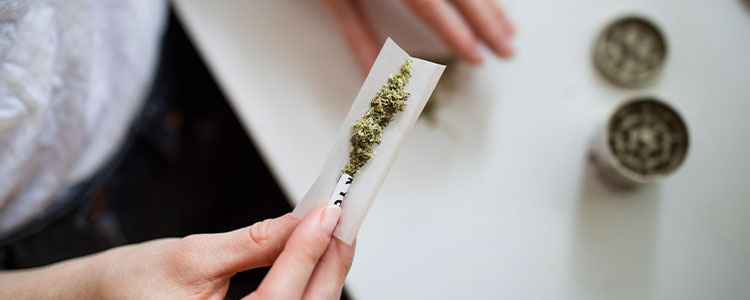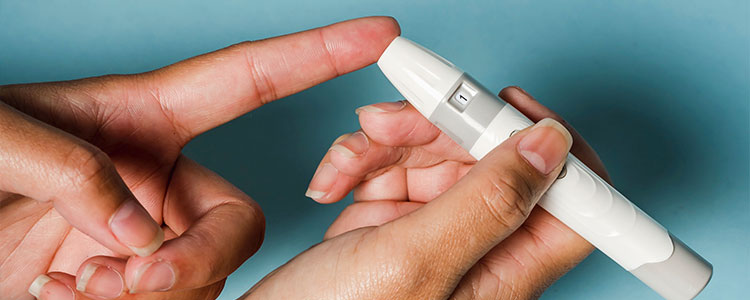In This Article
- Marijuana and Diabetes Research Out of Texas A&M
- Potential Benefits of Cannabis Use Among Diabetics
- Potential Side Effects of Cannabis Use Among Diabetics
- Cannabis and Diabetes FAQs
- Why would the research indicate heavy cannabis use might reduce diabetes in women but not men?
- What is considered heavy cannabis use?
- Does marijuana raise or lower blood pressure?
- Does smoking weed cause you to gain or lose weight?
- Is diabetes a qualifying condition for medical marijuana?
A recent research study suggests that women who are heavy cannabis consumers may be less likely to suffer from diabetes than women who don't consume cannabis. While the retrospective study's initial findings are interesting, the research remains in the very early stages, and more robust, controlled studies are required to understand the potential relationship between cannabis use and rates of diabetes.
The Centers for Disease Control and Prevention (CDC) reports that nearly 29 million people, or approximately 8.7% of the US population, are diagnosed with diabetes. Diabetes-related causes accounted for almost 88,000 deaths in 2019, making it the seventh leading cause of death in the country. Not only that, it's believed that millions more are unaware that they have diabetes, and almost 100 million people (or 38% of the total US population) have prediabetes.
These numbers suggest that diabetes is a severe medical condition affecting many people in America. However, an interesting study conducted by Texas A&M suggests that heavy marijuana consumption may positively lower the incidence of diabetes in women. But what conclusions can consumers really draw from the study?
Marijuana and Diabetes Research Out of Texas A&M

Researchers at Texas A&M examined data from the National Health and Nutrition Examination Survey (2013-2018). This data was collected from a group of around 15,000 participants, a majority of whom were women, white, older than 40, and college-educated.
The researchers first evaluated the participants’ cannabis use based on their exposure to the substance and the frequency they used it. Those who used marijuana less than four times a month were considered "light" users, while those who used cannabis more than four times a month were considered "heavy" users. The researchers relied upon physicians to determine the diabetes diagnosis of the participants.
They concluded that women who were heavy users of marijuana were less likely to have diabetes than women who didn’t consume cannabis. However, this exact correlation was not found with those women who were light users. Nor was there any association found between marijuana use and diabetes in men.
While the findings are compelling, the potential benefits of heavy cannabis consumption on the incidence of diabetes may have been overstated in some news sources. Most notably, this was a regressive study that looked at existing data for a relatively narrow population group (namely white, middle-aged, college-educated women). Socioeconomic factors can play a major role in rates of diabetes, and a controlled study of a wider group of individuals from different socioeconomic backgrounds should be conducted before drawing conclusions.
Potential Benefits of Cannabis Use Among Diabetics

Research has suggested that using marijuana could potentially benefit people suffering from diabetes. A report published by the American Alliance for Medical Cannabis stated that marijuana has the following potential benefits for people with diabetes:
- Regulate blood sugar
- Reduce inflammation in the arteries
- Relieve muscle cramps or abdominal pain
- Improve blood circulation
- Lessen blood pressure over long periods
- Help relieve neuropathic pain in topical form
- Improve sleep and calm nerves
However, these are still early or small-scale studies. Researchers have indicated that they don't know if the correlation is the result of cannabis use or other factors, and more work is needed to verify these early findings.
Potential Side Effects of Cannabis Use Among Diabetics
While the potential benefits of cannabis use among diabetics sound great, what are the possible side effects? Early studies suggest the most concerning aspect is the potential effect on their self-management habits. Self-management, whether it be dietary, monitoring blood sugar, or maintaining regular insulin injections, is critical for managing type 2 diabetes.
This rapid review out of Canada found that recreational marijuana use could negatively impact the self-management behavior of some individuals. The data also suggests that marijuana use may affect the metabolic factors of diabetes, which could ultimately lead to higher blood sugar levels.
Can microdosing improve self-management habits in cannabis consumers??
Microdosing involves taking very small or "sub-therapeutic" doses. Finding the correct cannabis dose is not always so straightforward, and many consumers are turning to microdosing as an alternative to larger, high-THC doses. Learn more about the potential benefits of microdosing marijuana.
Cannabis and Diabetes FAQs
Why would the research indicate heavy cannabis use might reduce diabetes in women but not men?
The reason why marijuana use may affect women and not men is actually simple: receptors vary between men and women.
Past studies on the endocannabinoid system (the series of neurotransmitters/receptors of the nervous system that absorb cannabinoids) have demonstrated that it differs between the sexes.
When it comes to marijuana, cannabidiol (CBD) and delta-9-tetrahydrocannabinol (THC) are the two primary cannabinoids that affect glucose disposal in the endocannabinoid system. As such, the researchers suggested that this glucose-related effect could be why heavy cannabis use could have such an isolated effect on women.
What is considered heavy cannabis use?
In this Texas A&M study, researchers defined heavy cannabis use as four or more times every month.
Does marijuana raise or lower blood pressure?
Early research from the American Alliance for Medical Cannabis suggests that marijuana use may contribute to lower blood pressure over time. While the correlation is interesting, a great deal more research and controlled studies are required. Furthermore, consumers should always consider a study's source - whether a group is traditionally pro-cannabis or anti-cannabis - and consult with their doctor before changing their daily routine or treatment regimen.
Does smoking weed cause you to gain or lose weight?
A major study published in 2013 by the American Journal of Medicine found that marijuana use had several effects relating to weight loss. These were:
- Cannabinoids may have a positive impact in regards to controlling blood sugar levels,
- In many cases, those who use cannabis regularly have a lower likelihood of being obese,
- In a similar vein, marijuana users typically have better cholesterol than those who do not use cannabis.
However, the study was not a controlled trial, and researchers don't yet know if cannabis use or some other lifestyle factor actually accounted for the beneficial effects. As with other similar claims, further study is required.
Is diabetes a qualifying condition for medical marijuana?
Many studies have been conducted that suggest using cannabis could help treat diabetes and its associated symptoms. Fortunately, diabetes is a qualifying condition in several states throughout the country.
The information in this article and any included images or charts are for educational purposes only. This information is neither a substitute for, nor does it replace, professional legal advice or medical advice, diagnosis, or treatment. If you have any concerns or questions about laws, regulations, or your health, you should always consult with an attorney, physician or other licensed professional.



